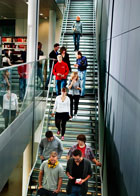New educational practice in the international classroom
The increased focus on internationalisation of higher education over the past few years has resulted in a range of changing conditions for teaching and learning environments at the University of Copenhagen. The project ‘Internationalisation and Language Skills’ is aimed at developing new initiatives across the University to strengthen the international dimension of study and learning environments.
Composing the international classroom
Educational settings where students and teachers have different first languages, cultural backgrounds and expectations about the teaching and learning processes and outcomes constitute challenges as well as opportunities. The new diversity issues have resulted in a wide range of initiatives across UCPH.
 At the Centre for Internationalisation and Parallel Language Use, the project ‘Internationalisation and Language Skills’ was set up in a realisation that “Greater student diversity and the future employment needs for global citizens have revealed a necessity for updating the university pedagogy and thus it has become increasingly necessary to listen carefully to the voices of both students and lecturers.”
At the Centre for Internationalisation and Parallel Language Use, the project ‘Internationalisation and Language Skills’ was set up in a realisation that “Greater student diversity and the future employment needs for global citizens have revealed a necessity for updating the university pedagogy and thus it has become increasingly necessary to listen carefully to the voices of both students and lecturers.”
As a result, best practices related to teaching and learning in the international classroom have been collected from lecturers and students across the University. Results have been published as a way of sharing experiences about teaching and being part of culturally heterogeneous student groups.
New Initiatives
Among the new initiatives at UCPH is an international programme at the Department of Clinical Medicine, where educational practices have been changed in order to introduce a 5-week, English language, medical rotation in paediatrics. Here, Danish and international medical students work together in pairs when having direct contact with patients in the outpatient clinic, in ward rounds, in the emergency room and on evening shifts.
Students in the programme benefit in a number of valuable ways. In particular, students have the opportunity to improve their language skills, learn about the health care system in other countries, and they have more time and closer contact to the associate professor.
Internationalisation with Active Learning
At the Department of Political Science, professor Ian Manners uses the student-centred learning pedagogy ‘Active Learning’ to ensure that both Danish and non-Danish students receive the basic international and intercultural skills and knowledge they need in today’s society.
In his class, students must work together on joint tasks in multinational activity groups. “The diversity of students is an important learning resource,” Professor Manners says. Political Science student Andreas Dinesen shares this view and states that “It makes no sense to study any international issue, whatever it might be, without somehow engaging in discussions with people from other countries.”
UCPH publications
Reflections and teaching experiences from the international classroom
A student perspective
As an international master’s student at the Department of Drug Design and Pharmacology at UCPH, Fraser G. Edgar has been surprised by the advantages of studying alongside classmates from different educational, cultural and social backgrounds.
He sums up his experience with these words “… so long as you can walk into the classroom with an open mind, you can only grow as a person and indeed a future scientist, thanks to the benefit of internationalisation at the University of Copenhagen.”
